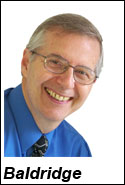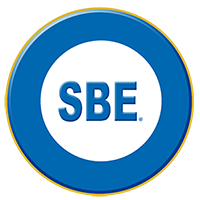The Society of Broadcast Engineers invites select industry professionals to be a part of the Society’s Technical Presenters Group. For a reasonable fee and travel expenses, groups such as state broadcasters associations, broadcasting companies, SBE chapters and others have the opportunity to include one of these presenters in their next engineering conference, or as a trainer for their engineering staff. Speakers from the SBE Technical Presenters Group are generally available to speak across the country.
Presentations can span one hour or up to a full day. For more information on this program, or to arrange a presentation for your group, contact the SBE Education Director.
“Chapter 53 arranged to have Wayne Pecena, CPBE, present a day-long session on IP Networking earlier this year. The SBE made it easy to bring an experienced, knowledgeable presenter to our area, and our members felt it was worth the time and money.”
— Jim Leifer, CPBE, member of SBE Chapter 53
Upcoming Programs
September 25, 2015 – SBE Chapter 47 is hosting an all day workshop “Electrical Safety for Broadcast Engineers” presented by Joseph O’Dwyer, President O’Dwyer Technical Services.
Current Topics
- FCC Enforcement Actions – an Analysis of Broadcast Violations, with Dennis Baldridge
Understanding the FCC Self-Inspection Checklists, with Dennis Baldridge - Chief Operator Responsibilities – What should I be doing?, with Dennis Baldridge
- Networking Technology for Broadcast Engineers, with Wayne Pecena
- Lightning protection, power issues, increased power line noise, etc, with David Brender
How do I confirm a presenter for my program?
Contact the SBE Education Director with the following details:
- Presenter and program of interest
- Date of interest (please also indicate if the date is flexible)
- Location, including city and state
- Desired length of presentation
- Your name, organization and contact information
Dennis Baldridge, CPBE, 8-VSB, AMD, DRB, CBNT
Hillsboro, WI
Regions willing to travel: Continental United States
 Dennis Baldridge has been working in the field of broadcasting for more than 30 years. He is a Senior Member of the SBE, holds an FCC Lifetime General License (formerly a First Class FCC License) and Amateur Radio Extra Class License (K0DB). Baldridge holds a Masters of Arts in Education (M.A.E.) and teaches science courses for Upper Iowa University. As owner of Baldridge Communications, LLC, he works as a contract engineer and has also authored several articles for Radio Guide.
Dennis Baldridge has been working in the field of broadcasting for more than 30 years. He is a Senior Member of the SBE, holds an FCC Lifetime General License (formerly a First Class FCC License) and Amateur Radio Extra Class License (K0DB). Baldridge holds a Masters of Arts in Education (M.A.E.) and teaches science courses for Upper Iowa University. As owner of Baldridge Communications, LLC, he works as a contract engineer and has also authored several articles for Radio Guide.
Baldridge has been associated with the Alternate Inspection Program of the Wisconsin Broadcasters Association for the past four years. His focus has been helping stations verify substantial compliance to the FCC rules through the use of the FCC’s Self-Inspection Checklists.
FCC Enforcement Actions – an Analysis of Broadcast Violations
Length of Time: 1-1.5 hours
This presentation will review of the most common violations committed by broadcasters, categorize them into groups and discuss how to prevent them. Also covered will be what to do if you receive a Notice of Apparent Liability or Notice of Violation.
Understanding the FCC Self-Inspection Checklists
Length of Time: 2-3 hours
The FCC publishes a self-inspection checklist for TV and radio stations to help them ascertain their level of compliance with the FCC rules and regulations. An affirmative response to all 100+ questions in the list implies substantial compliance. This presentation covers each question under the categories from the self-inspection checklists. Categories covered include administrative functions; antenna structures; Emergency Alert System (EAS); technical considerations; attended versus unattended operation; local marketing agreements (LMA); AM directional stations; and more.
Chief Operator Responsibilities – What should I be doing?
Length of Time: 1-2 hours
The licensee of each AM, FM, TV or Class A TV broadcast station must designate a person to serve as the station’s chief operator (FCC Rules 73.1870). Depending on the type of facilities, there are varying requirements as to who this person may be and their responsibilities. This training will cover the responsibilities of the Designated Chief Operator and the duties necessary to fulfill this position.
Wayne M. Pecena, CPBE, 8-VSB, AMD, DRB, CBNE
College Station, TX
Regions willing to travel: Continental United States
 Wayne Pecena is the assistant director of educational broadcast services in the Office of Information Technology at Texas A&M University. In this position, he serves as the director of engineering of TTVN: The Enterprise Videoconference and Data Network serving the Texas A&M University System and Public Broadcast stations KAMU-TV and KAMU-FM serving the Brazos Valley area. He is responsible for leading technology implementation for the enterprise network of the Texas A&M University System, supporting more than 150 IP data locations and more than 350 videoconference sites within Texas and internationally. In addition, Wayne is responsible for broadcast technology implementation at KAMU. He has more than 35 years of broadcast telecommunications experience and holds BS and MS degrees from Texas A&M University. He is a licensed private pilot and holds Amateur Radio Operator License N1WP.
Wayne Pecena is the assistant director of educational broadcast services in the Office of Information Technology at Texas A&M University. In this position, he serves as the director of engineering of TTVN: The Enterprise Videoconference and Data Network serving the Texas A&M University System and Public Broadcast stations KAMU-TV and KAMU-FM serving the Brazos Valley area. He is responsible for leading technology implementation for the enterprise network of the Texas A&M University System, supporting more than 150 IP data locations and more than 350 videoconference sites within Texas and internationally. In addition, Wayne is responsible for broadcast technology implementation at KAMU. He has more than 35 years of broadcast telecommunications experience and holds BS and MS degrees from Texas A&M University. He is a licensed private pilot and holds Amateur Radio Operator License N1WP.
Networking Technology for Broadcast Engineers
Length of Time: 4 hours – all day
This presentation focuses on TCP/IP based networking fundamentals in an Ethernet environment. Topics include TCP/IP and UDP Fundamentals, IP Addressing, Sub-netting Basics, an Introduction to IPv6, Switching Fundamentals, VLAN Use, Routing Fundamentals, Quality of Services (QoS) Basics, and Networking Security Concerns. Where appropriate, the application focus will be oriented towards a broadcast technical plant.
At the conclusion of this presentation, attendees will have:
- An awareness of major networking topics (broadcast focused)
- A basic understanding of topic fundamentals and principles
- Suggestions on where to obtain further knowledge
David Brender, P.E.
New York, NY
Regions willing to travel: Continental United States
David Brender is National Program Manager for the Copper Development Association (CDA) in New York City. His duties involve directing and managing the electrical programs at CDA, including their power quality, building wire program, telecommunications wire, research and National Electrical Code activities, among others. He has presented several times before to broadcasting technical audiences.
He is a principal member of Panel 5 of the National Electrical Code, a Senior Member of the IEEE, and a life member of the Association of Energy Engineers.
Brender holds a Bachelor’s degree from New York University and an MBA degree from Fairleigh Dickinson University in addition to being a licensed Professional Engineer in 3 states.
Questions?
Questions about SBE educational opportunities? Contact Cathy Orosz via email or by phone at 317-846-9000.

